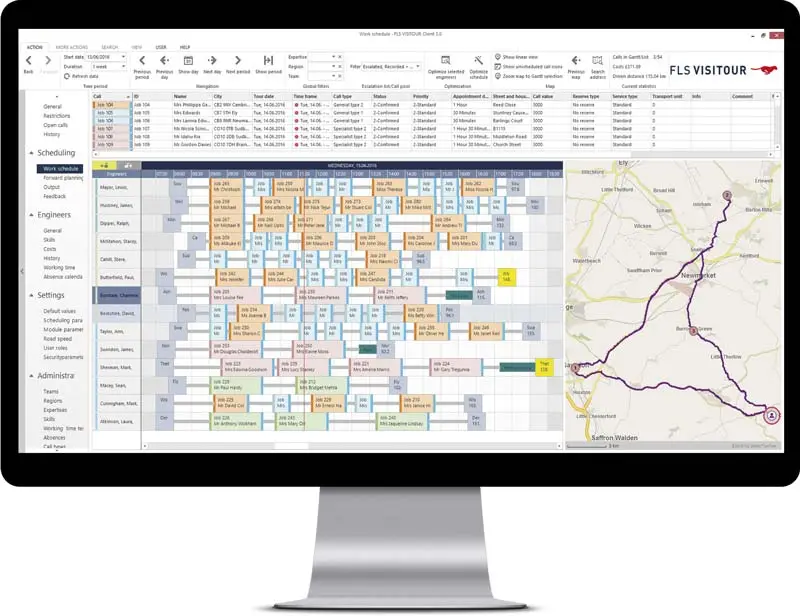
BLOG / SOLUTIONS · MOBILE WORKFORCE MANAGEMENT
HOUSING DISREPAIR CLAIMS: CRITICAL ASSETS AND MOBILE WORKFORCE MANAGEMENT
06 February 2023 · James Alex Waldron
As we grow more connected, data collection becomes more nuanced. Connected CRM and Housing Management Systems provide trends that can flag issues and evolving KPI pressures to Housing operators. As a technology developer we innovate digital tools for the Housing Sector based on matching emerging technologies with continual communication across the sector. Other sources, such as new laws (the 2022 Carbon Monoxide legislation) and Google Trends mirror where Housing Associations, Local Authorities, and Social Landlords have evolving requirements.
Searches for "housing disrepair claims" are up 60% in the past 5 years. Trend data proves the coldest months generate the most queries, every year.
WHAT ARE HOUSING DISREPAIR CLAIMS?
Housing disrepair claims refer to legal action taken by tenants against landlords who have failed to maintain a property to a liveable condition. This may include issues such as leaking roofs, broken boilers, or other hazards that affect the safety, health, and comfort of tenants. The claim may be brought in a court of law or through alternative dispute resolution such as mediation. To make a successful claim, the tenant must demonstrate that the landlord had a duty to repair the property and failed to do so. The compensation sought in a housing disrepair claim can include compensation for inconvenience and distress, as well as reimbursement for any expenses incurred as a result of the disrepair, such as medical bills or moving costs. Landlords have a legal obligation to maintain their properties in a safe and habitable condition and failing to do so can result in housing disrepair claims.HOW DO HOUSING DISREPAIR CLAIMS HAPPEN?
In a difficult economic climate, Social Landlords may be tempted to reduce resources and postpone time and skills allocation to planned repairs and maintenance (in favour of reactive/emergency appointments). Fuel prices, skills retention, inflation: Risk increases, and asset management becomes more difficult. Tenant satisfaction falls, assets lose value, and housing disrepair complaints flood into field service scheduling and field work administration departments. Claims escalate and the cycle of reactive appointments grows.Read: Field service optimisation: Software to manage in-day cancellations
FOCUS: MOBILE WORKFORCE MANAGEMENT ACROSS SOCIAL HOUSING
Dynamic scheduling software works to control and optimise field service operations. Real-time route planning systems help technical service teams, surveyors, and compliance experts to optimally plan and coordinate appointments and resources.Discover more solutions in the Housing sector:
HOW TO MITIGATE RISK OF HOUSING DISREPAIR CLAIMS
Mobile workforce management within field service refers to the process of scheduling and organising the deployment of field service operatives/technicians to different job sites. It involves allocating resources, such as the field operatives (and vehicles, parts, and skills such as gas safety training) to ensure that tenants' service requests are met efficiently and effectively. A dynamic field service scheduling technology will consider factors such as operative availability, skill sets, proximity to job sites, and job priority/SLA when creating schedules. The goal of mobile workforce scheduling is to minimise downtime, maximise productivity, and provide timely and high-quality service to tenants. Effective field workforce scheduling requires real-time data, flexibility, and a clear understanding of the cost and capabilities of field service operatives and equipment.FLS VISITOUR dynamic field service scheduling and route optimisation software helps field service operators in all markets, and already powers the mobile workforce requirements for tens of thousands of units in the Housing sector. Dynamic scheduling receives instruction in real time from the Housing Management System (HMS) or Customer Relationship Management (CRM) and calculates an optimised appointment offer. Schedulers and dispatchers improve their first-time fix rate, reduce fail rates (no-access) and optimise efficiency for planned and reactive maintenance appointments.
Read: Workforce management software can end housing maintenance backlogs
MOBILE WORKFORCE SCHEDULING BALANCES EVERY APPOINTMENT TYPE
Numerous housing-specific data points such as geocoded location, asset details and history, and impact are parameters entered into the real-time calculation. What results are the cost-optimised KPI-led (time-to-respond and time-to-fix) appointments. Efficiency is designed in to scheduling through combined route planning. Constraints such as vehicle type restrictions (size and weight) and actual time of day driving speeds affords schedulers and dispatchers complete transparency.- compliance checks
- annual upkeep
- linked appointments (voids)
- spot audits
- time to respond and time to fix
- asset data collection
- integration with ERP and CRM
- seamless customer service tools
- value for money
EXCEED YOUR OBLIGATIONS WITH MOBILE WORKFORCE MANAGEMENT FOR THE HOUSING SECTOR
To gain an understanding of tools to optimise the field experience for your mobile workforce and housing tenants book a short discussion or contact us at info@fastleansmart.com.Read more:
Improve Tenant Satisfaction Measures with Field Workforce Management software
Cost Control: Reactive maintenance with Field Service Management software
FLS: The ClickSoftware alternative for Field Service Management

JAMES ALEX WALDRON
UK Marketing Manager
+44(0) 1183 800189
Send email
James Alex Waldron has worked in written communications for over 10 years. Since 2021, he has written for FLS and the Solvares Group on the topics of digital field service transformation and mobile workforce management, and regularly provides insight to the industry press.





